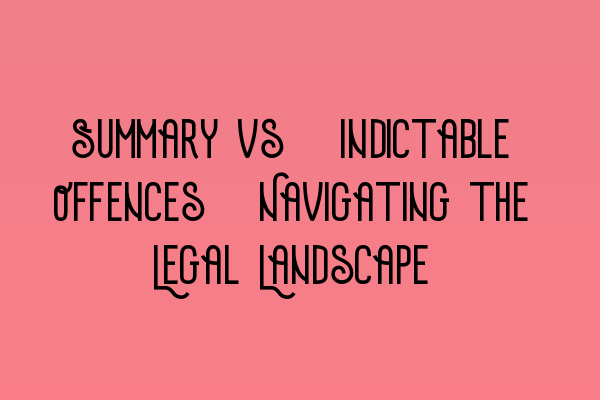Summary vs. Indictable Offences: Navigating the Legal Landscape
When it comes to understanding criminal offences in the UK, it’s essential to grasp the distinction between summary and indictable offences. These terms play a crucial role in determining the legal process and the severity of penalties for a particular criminal act. As a solicitor specializing in criminal law and practice at SQE Criminal Law & Practice Law UK, I aim to shed light on this topic and help you navigate the complex terrain of the legal system.
The Difference Between Summary and Indictable Offences
To start, let’s define the two types of offences:
- Summary Offences: These are less serious criminal offences that are typically dealt with in a magistrates’ court. Examples of summary offences include petty theft, minor assault, and some traffic violations. The punishment for summary offences is usually limited to a fine, community service, or a short term of imprisonment.
- Indictable Offences: Indictable offences are more serious criminal acts that warrant a trial in a higher court, such as the Crown Court. Examples of indictable offences include murder, robbery, and drug trafficking. The penalties for indictable offences are more severe and can result in longer prison sentences.
Understanding whether an offence is summary or indictable is crucial because it determines the legal process that follows. Here’s a breakdown of how each type of offence is handled:
Summary Offences
Summary offences are less complex and generally follow a simplified legal process. In most cases, the procedure includes the following steps:
- The arrest or issuance of a summons
- An initial hearing at the magistrates’ court
- The defendant enters a plea of guilty or not guilty
- If the defendant pleads guilty, the magistrate determines the appropriate punishment (fine, community service, or short-term imprisonment)
- If the defendant pleads not guilty, a trial date is set and the case may proceed to a magistrates’ court trial
It’s worth noting that some summary offences may be “triable either way,” meaning they can be tried in either the magistrates’ court or the Crown Court, depending on their severity or complexity. In such cases, the defendant usually has the option to choose where they would like the trial to take place.
Indictable Offences
Indictable offences involve more serious criminal acts and thus warrant a more formal legal process. Here’s an overview of how indictable offences are handled:
- The arrest or charge of the defendant by the police
- An initial hearing at the magistrates’ court, where the defendant is informed of the charges and their right to a trial by jury
- If the defendant pleads guilty, the case is referred to the Crown Court for sentencing
- If the defendant pleads not guilty, the case proceeds to a trial in the Crown Court, where a jury will decide the verdict
- If convicted, the judge determines the appropriate sentence, taking into account statutory guidelines and aggravating or mitigating factors
It’s important to note that some indictable offences, known as “either-way offences,” can be tried either in the magistrates’ court or the Crown Court. In such cases, the prosecution or the defendant may request the case to be heard in a different court.
Criminal Law Resources and Preparation
While understanding summary and indictable offences is vital for anyone navigating the legal landscape, it’s equally important to stay informed and prepared in all areas of criminal law. At SQE Criminal Law & Practice Law UK, we offer a range of workshops, seminars, and mock tests that can enhance your knowledge and expertise. Here are some related articles you may find valuable:
- Workshops and Seminars on Criminal Practice: Expanding Your Expertise
- Updates in UK Criminal Laws: Staying Informed and Prepared
- Mock Tests for SQE Criminal Practice: Exam Simulation for Success
- Enhancing Your SQE Criminal Law Study Group Experience
- Decoding Criminal Evidence Rules: A Detailed Analysis
By staying up to date with changes in criminal laws, participating in valuable workshops and seminars, and effectively preparing for exams through mock tests, you can enhance your understanding of criminal law and improve your chances of success.
Conclusion
Understanding the difference between summary and indictable offences is essential for anyone navigating the legal landscape in the UK. Knowing which legal process applies to a particular offence can significantly impact the outcome of a case. If you require legal representation or advice regarding criminal law matters, the experienced team at SQE Criminal Law & Practice Law UK is here to assist you.
For more information on criminal law resources and preparation, explore our website or check out the related articles mentioned above. We are dedicated to providing expert knowledge and support for your criminal law journey.
